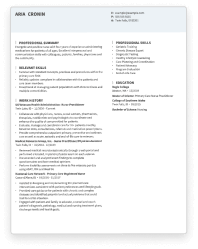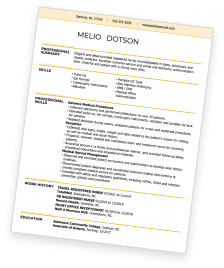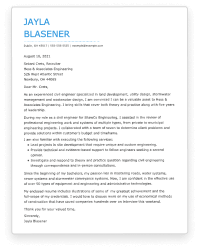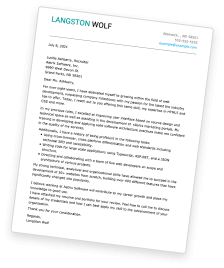Restaurant Manager Resumes: Overview
Restaurant management is a dynamic and challenging career. You are responsible for recruiting and managing employees, overseeing operations, handling customer issues, maintaining inventory, and ensuring all health and safety regulations are followed consistently.
Restaurant managers are needed in every culinary setting, including:
- Restaurants
- Hotels
- Fast Food Chains
- Cafes and Bars
- Hospital and School Cafeterias
From bustling urban cafes to upscale fine dining, restaurant managers ensure seamless operations and exceptional customer experiences. To be successful as a restaurant manager, you must be a master of multitasking, staff leadership, budgeting, and customer service.
Hloom is here to help you build a resume that makes your skills and experience shine! Start by exploring our restaurant manager resume examples, professionally designed resume templates, and expert advice for writing your own winning restaurant manager resume today!
Senior Restaurant Manager Resume Sample
Take a look at our first example of a restaurant manager’s resume. It uses a chronological format to showcase the candidate’s years of experience and uses a clean and modern design to catch the eye of hiring managers! Here’s why it stands out:
Clean and Modern Feel:
The modern design of this restaurant manager’s resume has a visually appealing layout that balances whitespace and text to avoid overcrowding the page. A clean layout that is well-organized and easy to read presents an image of professionalism that will make you stand out as a restaurant manager candidate.
Emphasizes Work Experience:
The chronological format of this restaurant manager’s resume showcases the candidate’s years of restaurant management experience. Focusing on the candidate’s work history demonstrates their ability to thrive in the fast-paced world of fine dining.
Persuasive Professional Summary:
This example of an experienced restaurant manager’s resume features a compelling summary statement that emphasizes the candidate’s experience and enthusiasm for the job. Using descriptive statements like “leading multi-million dollar restaurants and catering operations at award-winning restaurants,” and “driven to raise standards for fine dining and all aspects of guest relations.” demonstrates experience and ambition.
Subtle Use of Color:
This restaurant manager resume example uses one line of color across the top of the page to separate the candidate’s contact information from the body of the resume. Using a bold splash of red immediately catches the eye, making the reader want to know more.
Assistant Restaurant Manager Resume Sample
This second example of a restaurant manager’s resume uses a combination of format, visual appeal and well-written content to showcase skills and experience effectively. Here’s what we love about it:
Well-Organized:
This restaurant manager’s resume uses a combination format to visually balance the focus between their skills and work experience, providing a comprehensive overview of the candidate’s qualifications.
Emphasis on Relevant Skills:
This restaurant manager candidate highlights their most relevant skills at the top of their resume. This is an excellent technique for managers with limited experience to convey their ability to do the job. The candidate focuses on the top skills needed to manage a restaurant throughout the document.
Action Verbs:
The candidate creates engaging content by using strong action verbs throughout their work history section. Using words like produced, trained, managed, guided and checked helps the reader visualize this candidate doing the job.
Quantifies Achievements:
This restaurant manager also uses numbers and percentages to quantify their accomplishments in previous jobs. For example, instead of saying you prepared salad and pasta each day, say you “produced over 30 pasta and salad dishes per day.”
Or instead of saying you improved your team’s performance, say that you “trained, managed and guided 5 assistant cooks, improving overall performance and productivity by 70%.”
How to Write a Restaurant Manager Resume
When you are applying for a restaurant manager position, you want a resume that stands out from the competition by making your skills and experience shine! The first step to landing that interview is to write a compelling resume outline.
Need more advice about writing your resume before you get started? Check out our comprehensive how-to guide to take a closer look at crafting your resume!
Pick a Format
As a restaurant manager, you know that presentation is crucial. Choosing your resume format is all about presenting your skills and experience in the best way. Tailor your choice to highlight your strengths.
For example, if you have several years of restaurant or hospitality experience, a chronological resume format is a great way to emphasize your wealth of real-world experience.
However, if you are just beginning your culinary career, you could use a functional format to showcase your skills and qualifications instead of focusing on your job history.
If you are transitioning from a different career or only have a few years of experience, a combination format is a great choice. It combines elements of both functional and chronological resume formats to showcase your most relevant or transferable skills and work experience equally.
Contact Information
No matter which format you choose, you must include clear and professional contact details at the top of your resume. List your first and last name, phone number and email address. Make sure your information is easy to read and free of typos.
Resume Summary or Objective
Next, craft a compelling summary that lets the hiring manager know your career goals and key achievements. This statement should be brief but persuasive to make the reader want to know more about you.
A professional summary works best if you have previous experience as a restaurant manager. If this is the case, briefly discuss your experience and relevant skills.
However, if you are new to restaurant management or trying to get a promotion to management from another position, craft an objective statement to shift focus to your career goals and passion for the job.
Work History
Next, describe your work experience, focusing on achievements, responsibilities, and the impact you had on others. Start with your most recent job, and then work backward to detail your last 5 -10 years of experience.
Each job entry should include your job title, name of employer, location and the dates you were employed. Then under each job entry, include at least 3 bullets explaining your job responsibilities and accomplishments.
Use action verbs like trained, produced, managed, organized, increased or improved to grab the attention of hiring managers and demonstrate your abilities. Then, to illustrate the impact you had in each job, use numbers and percentages to validate your accomplishments.
For example, “improved customer service reviews by 20%” or “trained and supervised 20 employees per shift.”
Tailor these bullet points to each job you apply for by focusing on details from the job posting. Employers place a high value on your work history, so use them to promote your best qualities.
Skills
Now, in a separate section, list the skills that make you the best candidate for the job. Include a mix of hard and soft skills to show you are a great leader.
For example, showcase hard skills like budgeting, processing payroll and handling bank deposits, and soft skills like team leadership, customer service and stress management.
Your skills section is also a great opportunity to tailor your resume to the job description. Including skills mentioned in the job requirements will help you pass initial screenings by applicant tracking systems (ATS) and recruiters.
Education
Next, you will share your educational background by listing your highest level of education first, including the name of the institution and the location. If you have taken courses in hospitality, you can list that as well. You don’t need to include a graduation date unless you are still pursuing your education.
Additional Sections
Finally, if space allows, you can include additional sections like certifications, languages, or volunteer experience to add extra dimensions to your resume.
Just remember, your resume should ideally be one page long unless you have a very lengthy work history. So, keep any additional sections relevant to the restaurant manager position you are applying for.
To be successful as a restaurant manager, you need hard skills like food handling and payroll processing. But you will also need soft skills like conflict resolution and multitasking.
Including the right skills on your resume can be the difference between getting an interview or getting lost in a stack of other resumes. Customize your skills for each job application to reflect your abilities and fit for the job.
We’ve compiled a list of the top hard and soft skills for restaurant manager resumes to give you some ideas.
Top 5 Hard Skills for Restaurant Manager Resumes
- Budgeting and Financial Management: To stand out as a restaurant manager, showcase your ability to ensure efficient financial operations, manage payroll, review financial transactions and stick to a budget.
- Inventory Management: Great managers know how to manage inventory to prevent shortages or excess stock. Proper inventory management prevents waste and lowers costs.
- Staff Training and Development: Include this skill to let hiring managers know you know how to build a motivated and customer-focused team.
- Customer Service Excellence: Great restaurant managers know that running a successful restaurant isn’t just about making great food, it is about providing an excellent customer experience.
- Point of Sale (POS) Systems: An important computer skill, include your knowledge of navigating and leveraging POS systems to streamline transactions to demonstrate you are ready to get to work on day one.
Top 5 Soft Skills for Restaurant Manager Resumes
- Leadership: You’re not only a manager– you’re a leader who guides and inspires a team to achieve operational excellence.
- Communication: The ability to effectively convey ideas and expectations to staff and customers is crucial to your success. Emphasize your ability to manage teams and win over customers through effective written and verbal communication.
- Adaptability: As a restaurant manager, you must navigate dynamic and fast-paced restaurant environments with ease. Your ability to stay flexible and manage shifting priorities and unexpected challenges is the key to success.
- Problem-Solving: Let recruiters know you know how to address and resolve challenges to maintain smooth operations quickly.
- Time Management: As every successful restaurant manager knows, you must be able to juggle multiple tasks and responsibilities efficiently.
Boost your restaurant manager resume by including just the right hard skills, including technical skills, and soft skills to ensure you stand out as a well-rounded professional in the hospitality industry.
Top Certifications for Restaurant Managers
Including your relevant professional certifications on your resume validates your skills and experience. Earning certifications and pursuing additional training demonstrates your commitment to professional growth.
Many are offered online and can be completed in your spare time.In addition to required certifications in food handling and alcohol service, consider obtaining one of the following certifications:
- Restaurant Revenue Management: A certification in restaurant revenue management validates your ability to optimize restaurant space and pricing, manage meal durations and reservations, build demand during slow periods, and design menus.
- Food and Beverage Management: Taking courses in food and beverage management will demonstrate your ability to utilize income statements and operational data, optimize food and beverage menus, manage supply chains, build guest loyalty and lead teams to provide great customer service.
8 Tips For Writing A Restaurant Manager Resume
- Tailor to the Job: Customize your resume for each application to align with specific requirements listed in the job posting. Try to incorporate relevant keywords from the job description to pass through applicant tracking systems and get noticed by hiring managers.
- Quantify Achievements: Use numbers and percentages to quantify your accomplishments. Including measurements of success demonstrates the impact you had in each previous role.
- Highlight Leadership: Showcase your leadership skills in managing and motivating teams. Mention how many servers you have supervised, and emphasize team accomplishments under your management.
- Customer-Focused Language: Frame your work experience with a customer-centric focus to show your dedication to hospitality. For example, instead of just saying you managed inventory, you could say, “Managed inventory to keep costs low while consistently meeting customer needs.”
- Highlight Specializations: Emphasize any specialized training or certifications relevant to restaurant management. Special training or coursework will show you are dedicated to professional excellence.
- Use Action Verbs: Use powerful action verbs to convey a sense of accomplishment in your roles. Strong action verbs like purchased, monitored, and managed will make your writing more engaging, making the reader want to know more about you.
- Professional Design: Choose a clean and professional format and resume design to ensure your resume is easy to read and visually appealing for hiring managers.
- Proofread Thoroughly: Attention to detail is key to any management position, so carefully check your resume for typos and grammatical errors. It’s always a good idea to ask a friend or colleague to review your resume as well!
Helping Job Seekers Like You
View Similar Resumes
- Executive Chef Resume
- Sushi Chef Resume
- Cook Resume
- Restaurant Assistant Manager Resume
- Restaurant Manager Resume
- Baker Resume
- Dishwasher Resume
- Pastry Chef Resume
- Prep Cook Resume
- Line Cook Resume
- Kitchen Manager Resume
- Restaurant General Manager Resume
- Chef Resume
- Fast Food Manager Resume
- Sous Chef Resume


Save Time With Hloom's Resume Builder
Key Takeaways
- Craft a visually appealing resume to catch the attention of recruiters and hiring managers.
- Emphasize your ability to adapt to diverse environments and lead teams effectively.
- Showcase relevant certifications to validate your expertise in restaurant management.
- Frame your work experience with a focus on providing excellent customer service.
- Customize your resume for each restaurant manager application to demonstrate your ability to meet the specific job requirements.
Save Time With Our Cover Letter Builder












